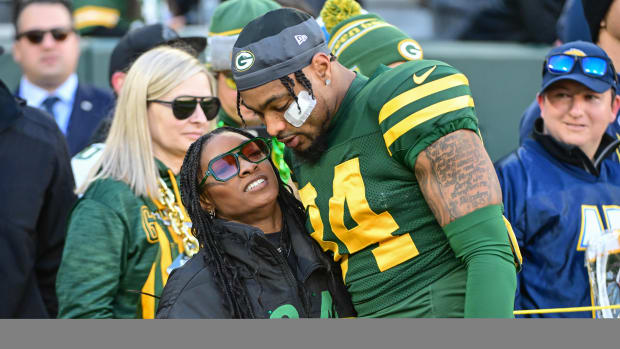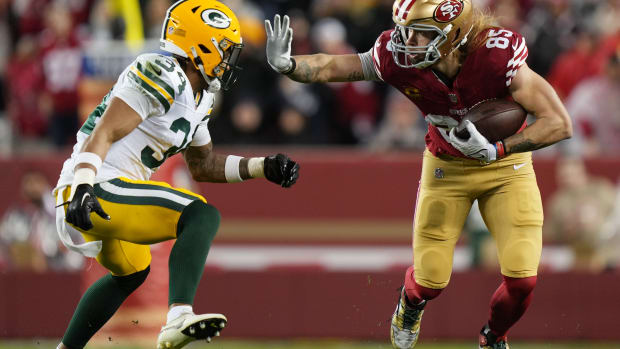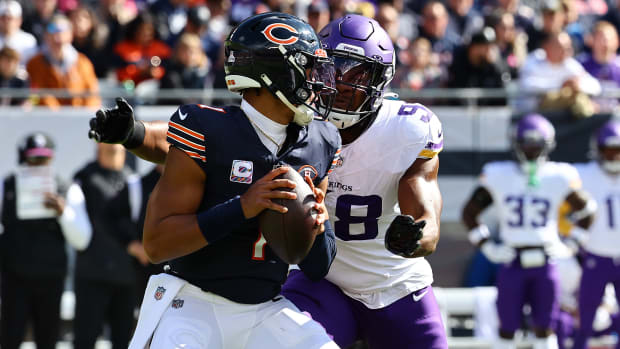Ryan Poles at the One-Year Mark
It's been exactly one year since the Bears put GM Ryan Poles in charge of their football operation on Jan. 25, 2022.
The manhunt conducted by George McCaskey, Bill Polian, Ted Phillips and their committee produced a GM who has not backed down from difficult negotiating situations or opportunities to improve the team. Nor has it brought them a GM without fault.
In the year that was, Poles has dropped down the totem pole in terms of his status with the team through no fault of his own, as the Bears hired Kevin Warren as their new president and CEO. They put him above Poles on the organizational chart. It had nothing to do with Poles' performance, but rather Warren's abilities compared to Phillips, who is retiring.
When Poles took over, at his opening press conference he was asked if the Bears could make a quick turnaround to a contender like the Cincinnati Bengals.
"Yeah, absolutely do I think we can be competitive and the beautiful about football is what we just saw with the Bengals," he said. "Everyone, once the Super Bowl, is played goes back to 0-0 and has the ability to improve their roster, make changes, we all know it’s fluid on a yearly basis so we’re going to attack it. Our goal is always going to be in contention and win games."
How well they've done at this so far is open to interpretation, but it must be pointed out the Bengals needed two full years of losing before becoming contenders.
Here are the highs and lows of what Poles has gone through in one year on the job, or the good, the bad and the ugly.
The Good
1. The Salary Cap
Poles inherited a salary cap situation that was a growing tumor on the organization thanks to former GM Ryan Pace's
mismanagement. Pace had been overspending and putting the cash against the cap in future years. Poles began dumping veteran with big paychecks or trading them -- like Khalil Mack and Roquan Smith -- some because of the cash or some because they didn't fit the defensive scheme coach Matt Eberflus would use. When they finished the 2022 season, they had been able to spend only $116.6 million of their original $209.9 in cap space because all of the rest of it, $93.29 million, was dead cap from the players Poles got rid of in order to rebalance the salary cap for the future.
Overthecap.com now has them at a revised figure of $92.03 million available yet to spend for 2023, the most by far available for any team.
2. Hiring Matt Eberflus
So far the wins and losses don't say it but Eberflus has been succeeding from the standpoint of what he calls building the foundation. This is what Poles stressed has occurred at the postseason press conference. Players on the roster now know what the HITS principle is and when they can restock the roster the foundation supports the talent. It came at a steep cost of 2022 wasted in terms of wins and losses.
3. Reorganized the Personnel Department
Poles hired and fired scouts after his first draft, and hired an assistant GM in Ian Cunningham, who has been good enough at what he does that Tennessee and Arizona considered him a finalist for vacant GM jobs.
4. Conducted Draft for 11 Players
Pace's first draft was a success on two counts. First, in terms of quantity, he hit a home run. The Bears had five picks in the draft when he was hired because Pace had traded them all away. It was a habit he had. Poles started trading down on Day 3 and eventually came up with 11 draft picks. One of those was Braxton Jones, a fifth-round tackle who made All-Rookie for the PFWA and Pro Football Focus. Safety Jaquan Brisker was a PFF All-Rookie Team member and also named Bears unsung hero by PFF. They had rookies on the field for more plays—offense, defense and special teams—than any other team. Their acquisitions included linebacker Jack Sanborn, an undrafted player named to the PFF All-Rookie team.
The Bad
1. Whoops
The rookie GM had scarcely begun cleaning up Pace's mess when he fouled up by signing free agent defensive tackle Larry Ogunjobi to a $40.5 million deal. They didn't have much to spend after the cap cleanup and what little they had was going to a player who wasn't properly vetted because he came to Halas Hall and couldn't pass a physical. So the deal was canceled and they had to settle for Justin Jones. As it turned out, Jones had a bit better season than Ogunjobi did after signing in Pittsburgh but neither had the kind of dominant year the Bears needed from a three technique for this scheme.
2. The Roquan Smith Battle
He got into a negotiation with Roquan Smith that wound up turning into a public mess because the linebacker felt he deserved top money for his position and Poles didn't think so. They couldn't find "common ground." In the end, he traded Smith and the former Bears linebacker made the Pro Bowl team for the first time while getting very close to what he wanted in money from the Bears.
3. Chasing Claypool
Poles traded the team's second-round pick for Pittsburgh wide receiver Chase Claypool, who had a reputation for some questionable on-field behavior at times with the Steelers. While Claypool didn't have much time to adjust to a new team or offense, he definitely didn't stand out with 14 catches in seven games and no touchdown receptions. It didn't help when he threw his helmet down on the sidelines in the blowout loss at Detroit. As he said, though, there is still much to be written about this trade and we'll see next season. He is in a contract year. For comparison's sake, Claypool's rookie season in Pittsburgh was 62 catches, 873 yards and nine TDs, while Steelers receiver George Pickens made 10 fewer catches for 72 fewer yards and five less touchdowns as a rookie.
It wasn't so much his lack of production or inability to fit in right away with the team as it was what the Bears gave up for him. The Bears not only wanted Claypool but wanted to keep the Packers from trading for him, so they gave up their own second-round pick instead of the one they acquired from Baltimore for trading Smith. So it's like a first-rounder this year when you take away Miami's first-round pick for tampering.
The Ugly
3-14
It doesn't get any worse in terms of total losses for the Bears in their history than what Poles' first team did. And to be fair, it was obvious what they were going to have to do from the start of the offseason. A complete rebuild does not happen without the letting of blood. They didn't win any after trading away Smith.
No Help for the QB
An entire season went by when it appeared Justin Fields was forced to do everything on his own after Poles didn't bring in sufficient offensive line or receiver help. The bad thing was, everyone said this would happen and it did. It was apparent because they had no money, but this didn't help make it easier to accept. It left a bad taste.
Because of the cap, Poles went as low budget as possible at receiver with only Byron Pringle ($4.1 million) and N'Keal Harry ($1.87 million) costing more than $1 million against the cap among acquisitions. They could have just kept all the money spent for all those questionable receivers, as well as the $2.2 million for tight end Ryan Griffin (4 catches), or $2.54 million for Armon Watts and $3.5 million for Al-Quadin Muhammad, who produced a sack apiece. If they diverted some of that cash they could have had a better receiver for Fields than those mentioned or Dante Pettis, Equanimeous St. Brown and Tajae Sharpe.
For less than the cost of all those receivers who produced so little, they could have signed JuJu Smith-Schuster at just over $3.76 million for 2022. He made 78 catches for 933 yards and three TDs with the Chiefs. Or former Chefs receiver DeMarcus Robinson was there for virtually nothing and made 48 catches for the Ravens.
The real solution would have been Pickens in the draft at receiver, although it would have cost them drafting Brisker.
The offensive line situation would have required more spending than they had resources to fix, and they probably did as good of a patch job as possible with Riley Reiff.
The Look Ahead
The real measure of how Poles has done will come this year when he now has the opportunity to make substantial changes through free agency and the draft, as well as with some contract extensions.
The time for blaming cap foul-ups by Pace is gone. Now, after one full year, it's all on Poles.
Twitter: BearDigest@BearsOnMaven





